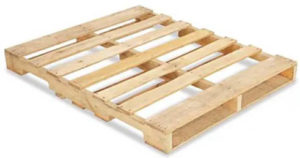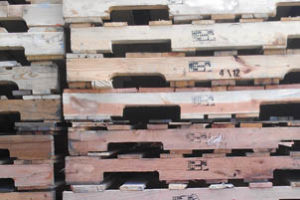Practically every industry that needs to transport large quantities of goods among the various stages of its supply chain – from manufacture to warehouse to distribution to retailer – relies on wooden shipping pallets. While pallets may be near-universally utilized for all manner of shipping tasks, however, they are very much not homogeneous; different types of goods to be shipped pose unique and diverse challenges for pallet manufacturers, and the ideal solution for one client may not suit another client’s needs. This is what makes it so essential, when seeking a pallet supplier to work with your business, to communicate clearly about your company’s needs and ask the right questions of your potential supplier. Here are a few important questions to help you begin that conversation with a pallet supplier.
What size of pallet best suits my product?
There are several commonly used pallet sizes, with the 48”x40” size – often referred to as the GMA pallet, as it is preferred by the Grocery Manufacturers Association – holding the position of most common throughout the North American market. Other frequently-used standard pallet sizes in the US include 42”x42” and 48”x48”. The European market is highly standardized due to the ease of trade among EU countries, with the standard 1200mmx800mm EPAL pallet dominating shipping in that part of the world. Pallets of less-popular dimensions are also available for purchase “off the rack,” but certain products may be best suited to custom-designed pallets.
Sometimes, the physical properties of your product may require custom pallets for safer shipping. Unusually heavy or dense items may need pallets made from hardwoods rather than softwood, or pallets structured to distribute the weight of the carried items more evenly. If the items being shipped are particularly fragile or susceptible to crushing or vibration, specially padded custom pallets or even shipping crates may be a safer choice. Items that are shaped oddly, with rounded bases, or have uneven weight distribution may need custom pallets that allow these unwieldy items to rest securely and remain properly secured.
What type of pallet do I need?
 Some of the same concerns that determine the ideal size of pallet your business requires will also inform the choice of materials from which your pallets should be constructed. The majority of shipping pallets in circulation in North America are made of wood; stringer pallets are commonly constructed from softwoods, while block pallets are generally built from hardwoods. Other materials may also be used to construct pallets, including injection-molded plastic, corrugated cardboard, and metal. Each material has advantages and drawbacks that make it better suited for some applications than others.
Some of the same concerns that determine the ideal size of pallet your business requires will also inform the choice of materials from which your pallets should be constructed. The majority of shipping pallets in circulation in North America are made of wood; stringer pallets are commonly constructed from softwoods, while block pallets are generally built from hardwoods. Other materials may also be used to construct pallets, including injection-molded plastic, corrugated cardboard, and metal. Each material has advantages and drawbacks that make it better suited for some applications than others.
How durable are these pallets?
 If you plan to use the same set of pallets within your company for multiple cycles, it’s important to know that the pallets you buy will withstand the test of time. Heat-treated hardwood pallets are very durable, though any wooden pallets will break down over time, and their longevity depends in part on the environment in which they are stored; exposure to moisture can harm the wood. Plastic pallets are impervious to water damage and quite durable, but are impossible to repair if damage does occur, as they are formed in a single piece at the time of manufacture. Wooden pallets can be readily repaired or refurbished as needed, with support pieces added or damaged boards replaced.
If you plan to use the same set of pallets within your company for multiple cycles, it’s important to know that the pallets you buy will withstand the test of time. Heat-treated hardwood pallets are very durable, though any wooden pallets will break down over time, and their longevity depends in part on the environment in which they are stored; exposure to moisture can harm the wood. Plastic pallets are impervious to water damage and quite durable, but are impossible to repair if damage does occur, as they are formed in a single piece at the time of manufacture. Wooden pallets can be readily repaired or refurbished as needed, with support pieces added or damaged boards replaced.
What about sanitary concerns and regulatory compliance?
Because wood pallets are constructed from lumber, pallet manufacturers need to treat their products in certain ways to prevent contamination by mold, insect larvae, and plant diseases. The International Plant Protection Convention (IPPC) has developed a set of standards intended to prevent the spread of insects and disease across international borders through contaminated wood materials, including wood packaging. These standards, the International Standards for Phytosanitary Measures No. 15 (ISPM-15), provide an array of options for the treatment of lumber to prevent contamination. Heat treatment in which the core temperature of the wood is raised to 56 degrees Celsius, or approximately 140 degrees Fahrenheit, for at least 30 minutes, is the most common method of compliance, though other acceptable sanitary measures exist, including fumigation with specific pesticides, are available. Compliant wood packaging is stamped or branded with the IPPC mark. Because there are multiple ways of achieving this regulatory compliance, you should discuss this matter with your pallet supplier; for instance, a food distributor may want to avoid chemically fumigated pallets out of concern over contamination.
Can the supplier meet your needs?
The volume of pallets you will need is another important concern. Inquire about taking a tour of the supplier’s pallet manufacturing facility, as this will help you determine if they can meet your needs. Does the supplier have a solid reputation of satisfied customers? What contingency plans does the supplier have in place for disruptions and shortages in the lumber market? You need a supplier who can ensure that your company has a steady supply of the pallets you need despite unforeseen complications in the industry environment.
Greenway Products & Services, LLC is the largest pallet re-manufacturer and recyclers in NY, NJ, PA, MD, and DE. We also accept scrap wood from our customers that we turn into valuable resources. Greenway is a highly-rated, full-service pallet management company. Contact us for a quote today at sales@greenwaypsllc.com. Visit our website, greenwaypsllc.com or call us at 732-442-0200. We can deliver trailers to you on a moment’s notice throughout the NY-NJ-PA-MD-DE Mid-Atlantic area.



Leave A Comment